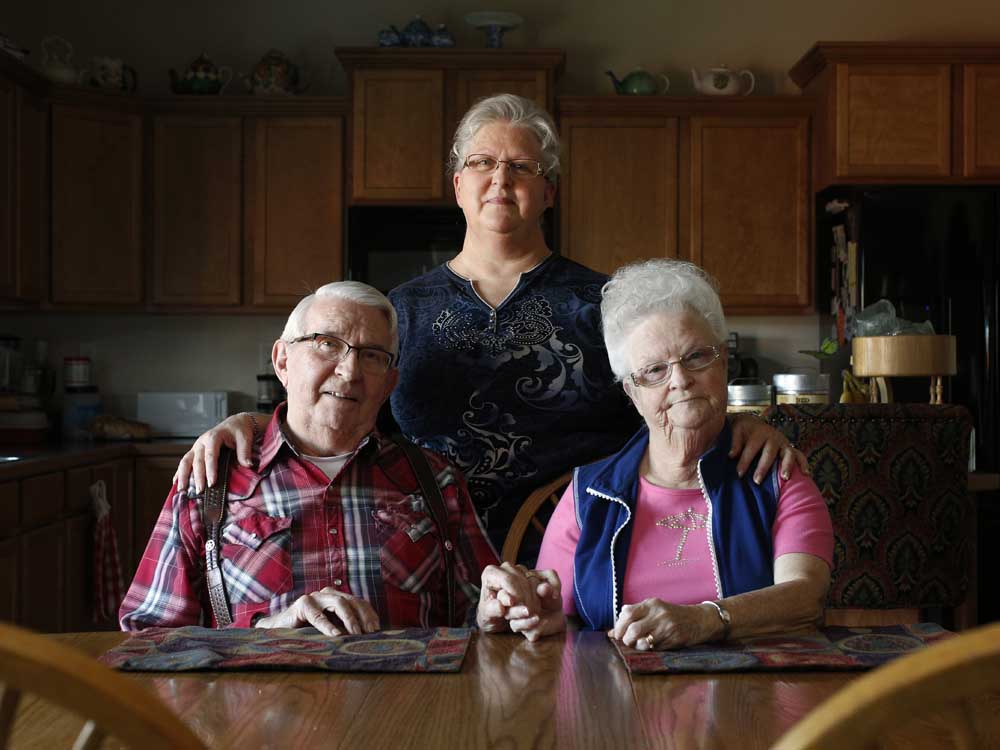Neurologists in short supply in Bend
Published 12:00 am Saturday, November 5, 2016

- Joe Kline / The Bulletin Pamela Seibold stands by her parents, Joel and Shirley Gentles, in the home where they live together in Redmond on Thursday. Seibold has been waiting for months for a neurology appointment for her mother, who is showing signs of dementia. Her father had previously been diagnosed with Alzheimer's disease, and with BMC discontinuing neurology, they're struggling to find care locally.
When Bend Memorial Clinic announced last month it would discontinue its neurology services, members of an Alzheimer’s caregiver support group in Redmond began to panic. The clinic had been the last neurology practice in Central Oregon still accepting dementia patients. If it was going to close its doors, who would care for their loved ones?
“We have lost all of our neurological doctors,” said Kevin Seibold, a pastor in Redmond whose wife cares for two aging parents. “This is a crisis situation not just for ourselves but for the aging population and all the elderly folks who are moving here to retire.”
While it’s now clear that the BMC neurologists will remain in Bend and transition to a new practice at the start of the year, the supply of neurologists in Central Oregon remains woefully short of demand. Over the past year, both BMC and Bend Neurological Associates have had to triage their patient caseloads to ensure patients with urgent neurological problems such as seizures and strokes could be seen in a timely manner. That has resulted in wait times of weeks if not months for patients with less dire needs, including those with Alzheimer’s disease and dementia.
“It’s been brutal. We’ve had to turn away all kinds of stuff,” said Dr. Michael Bell, one of three neurologists with Bend Neurological Associates. “We have literally had to close our doors to 95 percent of dementia referrals to keep the doors open for more urgent problems.”
Falling numbers
Central Oregon has been undersupplied for some time, but the retirement of three veteran neurologists and the departure of another has cut the number from a high of 10 neurologists five years ago, down to six.
“The demand is probably double that,” said Dr. Steve Goins, one of the three neurologists at Bend Memorial Clinic. Goins came to Bend last year after working in Eugene for nearly three decades.
“Things were busy in Eugene,” he said. “But I came over here and I didn’t appreciate until we got started that it’s a real shortage area.”
The clinic set up a triaging system to ensure urgent patients, particularly those referred from the emergency room or discharged from the hospital, could be seen within a week or two. But as the three remaining doctors had to absorb the patients left behind by their retiring colleagues, wait times climbed as long as three months.
“That’s really not ideal,” said Dr. Craigan Griffin, another of the BMC neurologists. “I feel like I’m compromising the quality of care I’d like to provide patients.”
The caseload made it difficult for the doctors to follow up with patients to see how they were doing on medications.
“It was a real struggle,” Goins said. “Our first duty was to established patients, people who needed follow-up. We’ve been so busy we had to shut down our practice to new referrals about three months ago.”
Goins, Griffin and Dr. Francena Abendroth will join a new practice, Pacific Crest Neurology, in January, to be housed in the Pinnacle Building on Mary Rose Place on the east side of Bend. The practice will be owned by Adaugeo Healthcare Solutions, the company that owns High Lakes Health Care and several specialty practices in Central Oregon.
“Neurology was already at the top of list of areas that our patients have desired additional access,” Adaugeo administrator Dan McCarthy said, and High Lakes primary care physicians had complained that referrals to neurology often took several weeks if not months.
Attracting doctors
Adaugeo has plans to expand the neurology practice next year, adding physician assistants and two new neurologists. Bend Neurological Associates is also planning on hiring two additional neurologists next year.
But recruiting neurologists has been a challenge, in part because of a nationwide shortage of them. A 2013 study published in the journal Neurology, found that nationwide there was a gap of more than 1,800 full-time neurologists, and that the gap was expected to grow to 3,380 neurologists by 2025. The researchers said Oregon’s shortfall of 40 neurologists would grow to 62 by 2025.
“We’re predicting about a 20 percent shortfall of neurologists over the next 10 years,” said Dr. Nicholas Johnson, an assistant professor of neurology at the University of Utah, and chairman of the government relations committee for the American Academy of Neurology. “Particularly here in the West, the issues in terms of neurologists are very significant.”
He attributed the shortfall to a freeze on residency slots nationwide that has prevented more doctors from being trained, and an increasing paperwork burden that has prompted older neurologists to retire. According to physician research and consulting firm Merritt Hawkins, in 2013, a full 50 percent of practicing neurologists were older than 55 and nearing retirement.
Neurology may be less attractive to prospective doctors than other specialties in part because of the payment system that reimburses physicians for performing procedures. Specialties such as neurology or primary care that involve discussing, diagnosing and managing health problems suffer in comparison.
“Taking the time to diagnose a patient with Alzheimer’s disease and then talking to them about the diagnosis and management takes a tremendous amount of time,” Johnson said. “It takes a lot more time than a simple procedure.”
Neurologists also tend to choose more urban areas to practice, making it harder to recruit them to Central Oregon.
“Neurologists tend to be city nerds,” Bell said. “We’re not like orthopedic surgeons who want to ski Mt. Bachelor.”
Griffin says it’s been harder to recruit new neurologists to Central Oregon in part because they are still required to be on call for emergency cases at the hospital, as often as once a week.
“I think the younger neurologists are really looking for a work situation where there is a hospitalist taking care of the inpatient, and they are freed from nighttime call,” he said. “That may be true in other areas, but that hasn’t occurred in Central Oregon.”
Waiting game
With limited access, some area caregivers are taking elderly patients to Portland or other places in the valley with better access to neurology services. But that can be a difficult trip with an elderly dementia patient.
That also could leave patients with migraines or other neurological issues to rely on primary care doctors, who lack the specialized neurological training and experience, and who may struggle to manage more complex conditions in the limited time of a primary care appointment.
Seibold and his wife, Pamela, had been waiting four months for a neurology appointment for her elderly mother when they learned BMC was discontinuing its neurology practice. Her father had been diagnosed with Alzheimer’s disease six years ago, and her parents had moved to Redmond last year to live with them. Now her mother is showing signs of dementia, and Seibold wants to get her evaluated.
“We really need to have our first appointment,” she said. “The earlier treatment can begin, the better off you are long term.”
Her father had an appointment scheduled at Bend Memorial Clinic in November, but she canceled it, not wanting to start the process with a doctor who might be leaving.
“The biggest problem is who do you reach out to? Where is that support?” she asked.
That’s left the Seibolds wondering whether the region, with its aging population and reputation as a retirement destination, is prepared for the onslaught of elderly needing care and services.
“If we can’t give sufficient and efficient care to the aging population, what’s the use in building all this elder care?” she asked. “What’s the use in making these services available, if you don’t have the right specialists to support the needs of that community?”
Griffin agrees the region is not yet prepared for the demand.
“Because we’re very much a retirement community, there’s inevitably going to be more and more patients reaching an age where memory care and dementia is going to be a concern,” he said. “The community as a whole is going to need to come together to develop these resources.”
— Reporter: 541-633-2162,
mhawryluk@bendbulletin.com








